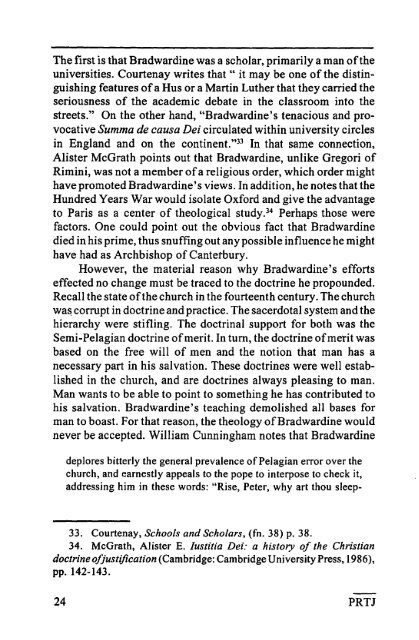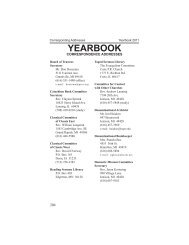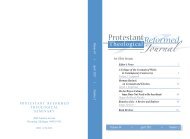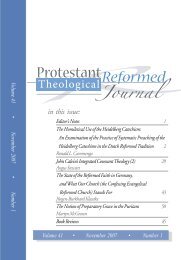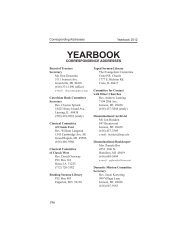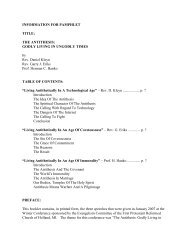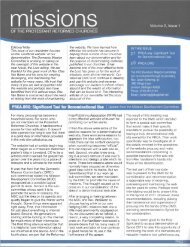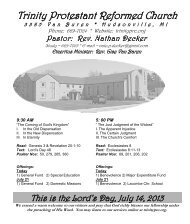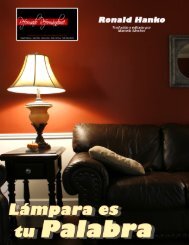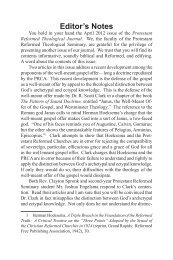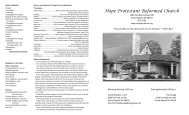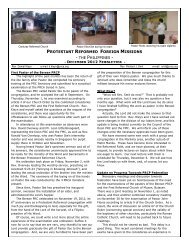pdf - Protestant Reformed Churches in America
pdf - Protestant Reformed Churches in America
pdf - Protestant Reformed Churches in America
You also want an ePaper? Increase the reach of your titles
YUMPU automatically turns print PDFs into web optimized ePapers that Google loves.
The first is that Bradward<strong>in</strong>e was a scholar, primarily a man oftheuniversities. Courtenay writes that" it may be one ofthe dist<strong>in</strong>guish<strong>in</strong>gfeatures ofa Hus or a Mart<strong>in</strong> Luther that they carried theseriousness of the academic debate <strong>in</strong> the classroom <strong>in</strong>to thestreets." On the other hand, "Bradward<strong>in</strong>e's tenacious and provocativeSumma de causa Dei circulated with<strong>in</strong> university circles<strong>in</strong> England and on the cont<strong>in</strong>ent."33 In that same connection,Alister McGrath po<strong>in</strong>ts out that Bradward<strong>in</strong>e, unlike Gregori ofRim<strong>in</strong>i, was not a member ofa religious order, which order mighthave promoted Bradward<strong>in</strong>e's views. In addition, he notes that theHundred Years War would isolate Oxford and give the advantageto Paris as a center of theological study.34 Perhaps those werefactors. One could po<strong>in</strong>t out the obvious fact that Bradward<strong>in</strong>edied <strong>in</strong> his prime, thus snuff<strong>in</strong>g out any possible <strong>in</strong>fluence he mighthave had as Archbishop of Cantetbury.However, the material reason why Bradward<strong>in</strong>e's effortseffected no change must be traced to the doctr<strong>in</strong>e he propounded.Recall the state ofthe church <strong>in</strong> the fourteenth century. The churchwa~ corrupt <strong>in</strong> doctr<strong>in</strong>e and practice. The sacerdotal system andthehierarchy were stifl<strong>in</strong>g. The doctr<strong>in</strong>al support for both was theSemi-Pelagian doctr<strong>in</strong>e ofmerit. In turn, the doctr<strong>in</strong>e ofmerit wasbased on the free will of men and the notion that man has anecessary part <strong>in</strong> his salvation. These doctr<strong>in</strong>es were well established<strong>in</strong> the church, and are doctr<strong>in</strong>es always pleas<strong>in</strong>g to man.Man wants to be able to po<strong>in</strong>t to someth<strong>in</strong>g he has contributed tohis salvation. Bradward<strong>in</strong>e's teach<strong>in</strong>g demolished all bases forman to boast. For that reason, the theology ofBradward<strong>in</strong>e wouldnever be accepted. William Cunn<strong>in</strong>gham notes that Bradward<strong>in</strong>edeplores bitterly the general prevalence ofPe)agian error over thechurch, and earnestly appeals to the pope to <strong>in</strong>terpose to check it,address<strong>in</strong>g him <strong>in</strong> these words: HRise, Peter, why art thou sleep-33. Courtenay, Schools and Scholars, (£n. 38) p. 38.34. McGrath, Alister E. Iustitia Dei: a history of the Christiandoctr<strong>in</strong>e ofjustification (Cambridge: CambridgeUniversity Press, 1986),pp. 142-143.24 PRTJ


